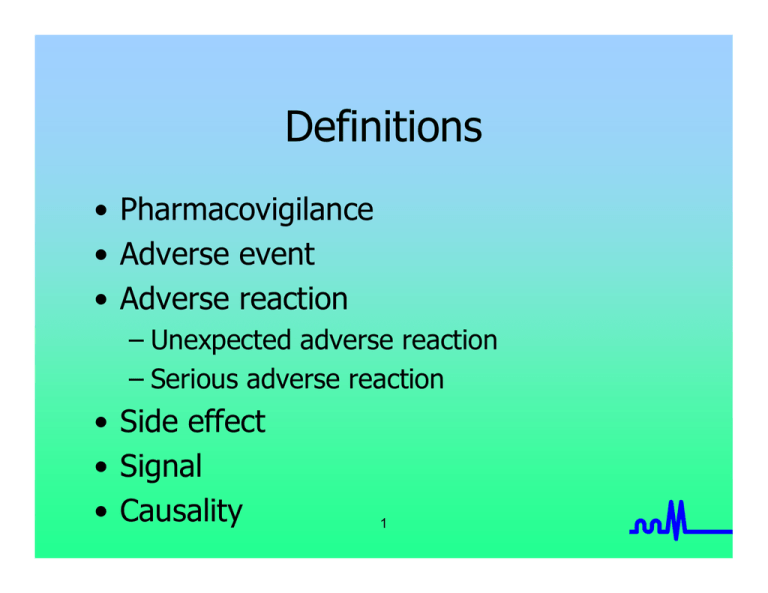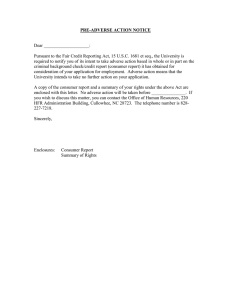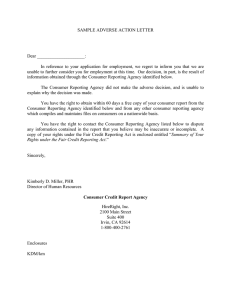Definitions - World Health Organization
advertisement

Definitions • Pharmacovigilance • Adverse event • Adverse reaction – Unexpected adverse reaction – Serious adverse reaction • Side effect • Signal • Causality 1 Definitions • Organisations involved: – WHO - World Health Organization – CIOMS - Council of International Organizations of Medical Sciences – ICH - International Conference on Harmonisation 2 Pharmacovigilance WHO, 2002 • The science and activities relating to the detection, assessment, understanding and prevention of adverse effects or any other drugrelated problem 3 Adverse event • Medical occurrence temporally associated with the use of a medicinal product, but not necessarily causally related 4 Adverse reaction WHO, (1972) • 'A response to a drug which is noxious and unintended, and which occurs at doses normally used in man for the prophylaxis, diagnosis, or therapy of disease, or for the modifications of physiological function'. 5 Unexpected adverse reaction • Not consistent with applicable product information or characteristics of drug. 6 Side effect • Unintended effect occurring at normal dose related to the pharmacological properties 7 Signal • Possible causal relationship adverse event and drug • Previously unknown or incompletely documented • More than one report is needed. Depending on: – Quality of the information – Seriousness of the event 8 Serious adverse event or reaction • Any untoward medical occurrence that at any dose; – Results in death – Life threatening – Requires inpatient hospitalization or prolongation of existing hospitalization – Results in persistent of significant disability or incapacity 9 Frequency of adverse drug reactions (CIOMS) • • • • Very common Common (frequent) Uncommon (infrequent) Rare • • • • >= 1/10 > = 1/100 and < 1/10 >= 1/1000 and < 1/100 >= 1/10000 and < 1/1000 • < 1/10000 • Very rare 10 Certain • Event or laboratory test abnormality, with plausible time relationship to drug intake – Cannot be explained by disease or other drugs – Response to withdrawal plausible (pharmacologically, pathologically) – Event definitive pharmacologically or phenomenologically (An objective and specific medical disorder or a recognised pharmacological phenomenon) – Rechallenge (if necessary) Drug Safety111994;10:93-102 Probable – Event or laboratory test abnormality, with reasonable time relationship to drug intake – Unlikely to be attributed to disease or other drugs – Response to withdrawal clinically reasonable – Rechallenge not necessary 12 Possible – Event or laboratory test abnormality, with reasonable time relationship to drug intake – Could also be explained by disease or other drugs – Information on drug withdrawal lacking or unclear 13 Unlikely – Event or laboratory test abnormality, with a time to drug that makes a relationship improbable (but not impossible) – Diseases or other drugs provide plausible explanations 14 Conditional / Unclassified – Event or laboratory test abnormality – More data for proper assessment needed – Or additional data under examination 15 Unassessable / Unclassifiable – A report suggesting an adverse reaction – Cannot be judged because of insufficient or contradictory information – Report cannot be supplemented or verified 16

